#design pedagogy
Explore tagged Tumblr posts
Text

June Jordan, "Life Studies," 1966-1976, Edited by Connor Tomás Reed and Talia Shalev, Lost & Found, The Center for the Humanities, The Graduate Center, CUNY, New York, NY, 2017
#graphic design#pedagogy#education#poetry#booklet#cover#june jordan#connor tomás reed#talia shalev#lost & found#the center for the humanities#2010s
42 notes
·
View notes
Text

I made this image using code. The language/environment of choice is Kojo by Lalit Pant. It's influenced by Logo and Processing. You can try it out here: https://www.kogics.net/projects/
This image was made by remixing a Mondrian painting generator that was created by a member of the Kojo community and changing the code to create new shapes and patterns. I've tried to track down the original project but I can't find a link right now. At any rate if the original author of the code would like to take credit please contact me!
#Kojo#Logo#Papert#Pedagogy#Generative Art#Logos#Design#Contemporary#Creative Coding#Processing#Turtles#Robot Turtles#William Grey Walter#Roomba
9 notes
·
View notes
Text
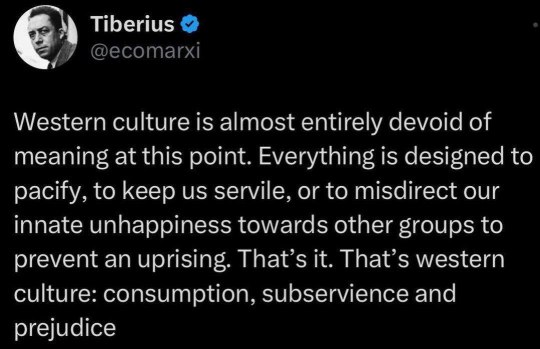
Western culture is designed to pacify us
#Western culture is designed to pacify us#western culture#culture#culture is not your friend#facts#fact#fyi#psa#ausgov#politas#auspol#tasgov#taspol#australia#fuck neoliberals#neoliberal capitalism#anthony albanese#albanese government#class war#oppression#repression#capitalism#fascism#eat the rich#eat the fucking rich#anti culture#oppressor#free all oppressed peoples#pedagogy of the oppressed#oppressive
17 notes
·
View notes
Text
Saw a post about media analysis and the concept of "when all you have is a hammer, everything looks like a nail" and how certain kinds of media train you to approach them in a certain way, which can make approaching media which is radically different challenging and lead to misinterpretation.
It reminded me of a class I took a little while ago on crisis communications. This is a brand of corporate communications based on... well crises. What corporations should say/do after something big and bad happens to/because of them. Could be anything from a terrorist attack to a sexual harassment scandal.
I had a lot of trouble in this class. Not academically. I got all my work done just fine. I just thought that the concept was a bit dodgy. Like we talked about an oil company really fucking up their communication after a big spill and how the CEO didn't talk to the press and public well. And my first thought when I heard this was "well maybe they shouldn't have been transporting all that oil given what we know about the environmental hazard" and my second thought was "it doesn't really matter how they talk to the public afterward because our society is built around needing oil and no matter how shitty they are we still need to buy their product."
Our final paper was to analyze how hospitals approached the covid pandemic from a communications standpoint, where they went wrong, and design a crisis communications plan for future pandemics. And I wrote mine about how the covid pandemic didn't get out of control because healthcare providers failed to communicate the nature of the pandemic in an accurate and useful way, but because of a systemic failure at every level for the government to adequately address it. My "crisis communication plan" was that hospitals needed to become politically engaged with the public and tell them that in order to adequately address future pandemics, we need publically-funded hospitals where medical professionals are empowered to directly help their communities instead of expecting a system of elected bureaucrats to know exactly how to deal with complicated social and medical issues. Because the problem is not what hospitals say, it is what hospitals are even allowed to do.
My professor's grading notes were "not what I was looking for but good points." I think I got a B on that paper.
This also makes me think of cryptocurrency. How there are all of these issues with our economy, and instead of fixing those problems, a bunch of computer programmers decided they had the solutions and designed a currency that doesn't fundamentally change the nature of money but sure does involve a lot of programming. We've been talking about this in my class on digital media and I just keep saying "These problems aren't about whether the technology is good enough, it's about what we are asking the technology to do. We cannot have a decentralized and democratically controlled currency because capitalism is not democratic or decentralized." (My digital media professor has been much more receptive to these criticisms and has joked that I should be teaching this section.)
When all you have is a hammer, everything looks like a nail. When all you know how to do is write a press release, every problem is the result of not writing a good enough press release. When all you know how to do is program computers, everything is a problem of not listening to the people who know how to program computers.
#i love the humanities#but the pedagogy is designed around getting a job#not actually solving or even understanding problems
4 notes
·
View notes
Text
What is Constructivism?
Photo by Annie Spratt Constructivism is a theory of learning and knowledge that posits that individuals construct their understanding and knowledge of the world through experiences and reflecting on those experiences. This theory has profound implications in various fields, including education, psychology, and epistemology. Let’s delve into the key aspects of constructivism, its historical…
#Constructivism in Education#Constructivist Approach#Constructivist Assessment#Constructivist Classroom#Constructivist Curriculum#Constructivist Learning Activities#Constructivist Learning Benefits#Constructivist Learning Challenges#Constructivist Learning Environment#Constructivist Learning Model#Constructivist Learning Outcomes#Constructivist Learning Principles#Constructivist Learning Resources#Constructivist Learning Techniques#Constructivist Learning Theory#Constructivist Pedagogy#Constructivist Philosophy#Constructivist Strategies#Constructivist Teaching Methods#Constructivist Theory Examples#Instructional Design#Instructional Design Models
0 notes
Text
Olá! 😁
Sou a Maria Vitória, estudante de Design da USJT. Eu e meu grupo estamos fazendo um TCC sobre educação sexual infantil e criamos um formulário para profissionais da área de pedagogia e psicologia, sua ajuda será muito importante!
Aqui está o link: https://docs.google.com/forms/d/1EYQq5DswaaiRRJ6Eq2JIogYaXRF9EaPhnUiPXG_PlRA/edit
Desde já, agradeçemos muito pela sua participação! 🙏
1 note
·
View note
Text
The Top Five Mistakes That Trainee High School Teachers Are Making
An article by Richard James Rogers (Award-Winning Author of The Quick Guide to Classroom Management and The Power of Praise: Empowering Students Through Positive Feedback). This blog post has been beautifully illustrated by Pop Sutthiya Lertyongphati. Anyone who is new to the teaching profession is bound to make mistakes. There’s so much to learn and so much is at stake: the future careers of…
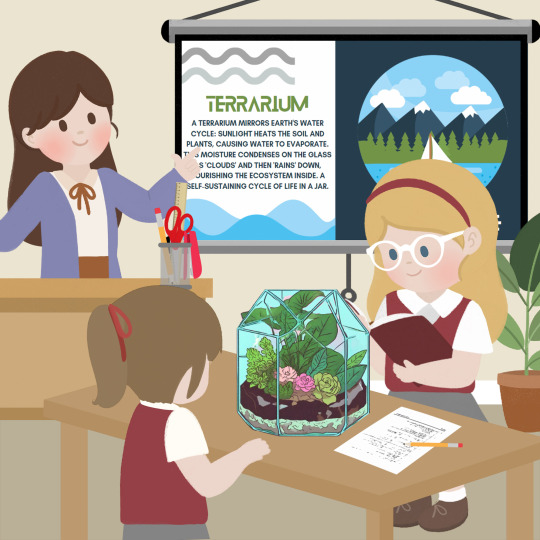
View On WordPress
#blended teaching#classroom#Design Thinking in Teaching#EAL Teaching#education#ELD Teaching#english teaching#ESL Teaching#happiness teacher#hybrid teaching#international teaching#Newly Qualified Teacher#online teaching#parent-teacher#pedagogy#planning#Post-pandemic teaching#Practical Teaching Tips#Practical Teaching Tips Podcast#professional distance#remote teaching#richard james rogers#Richard James Rogers award-winning author#Richard James Rogers bestselling author#richardjamesrogers#teaching#trainee teacher#trainee teachers
0 notes
Text
This is a thought leadership blog post I wrote while working for Classkick. I also created the graphics.
1 note
·
View note
Text
Immersive Edutainment: Exploring the World of E-Learning with Captivate, Unity, VR, and Mozilla Hub. Game-Based Learning and Buddhism, Obviously.
In the fast-evolving world of education, the integration of technology has revolutionized the way we learn and engage with content. As an eLearning instructor, I recently had an exhilarating experience producing and developing an interactive module that blended game-based learning, virtual reality (VR), and Mozilla Hubs to create captivating edutainment content. Join me on this exciting journey…
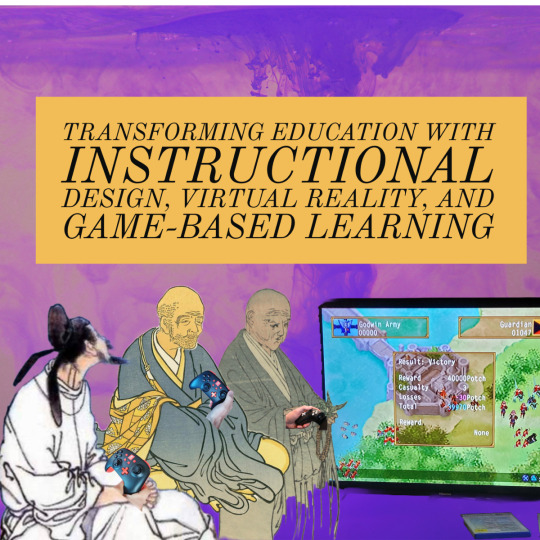
View On WordPress
#Captivate eLearning#Digital Game Narratives#Digital Learning#E-Learning Solutions#EdTech Innovations#Educational Gamification#educational technology#Engaging eLearning Content#Experiential Learning#Future of Learning#game based learning#Game Design for Education#Game Writing in Education#Gamification in Education#Gamified Assessment#Gamified Instructional Strategies.#Gamified Learning#Immersive Education#Immersive Learning Experiences#Innovative Pedagogy#instructional design#Interactive Learning#Interactive Simulations#Technology-Enhanced Learning#Transformative Education#Virtual Experiential Learning#Virtual Learning Environments#Virtual Reality in Education#VR Learning Applications#VR Simulations
0 notes
Text
Supercharge Your Teaching Materials: Unleash the Power of Chat GPT on Resource Development for Educators
📚 Looking for ways to enhance your teaching resources and save time? Check out my latest blog post on using AI tools like ChatGPT to create contextualised materials and assessments. Discover the power of AI in education!
Accelerate Your Resource and Teaching Materials Creation Process with Chat GPT While it may not always deliver perfect results, leveraging targeted prompts with Chat GPT to generate teaching materials can significantly speed up your workflow. Discover how this innovative tool allows you to generate solid drafts that serve as a foundation for creating high-quality resources, all while reclaiming…
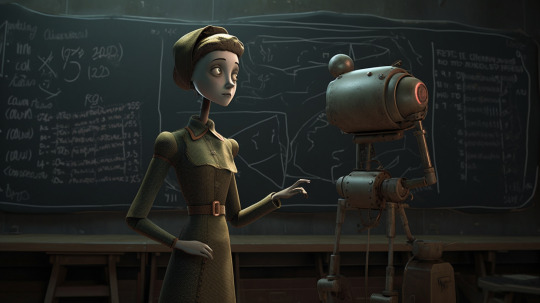
View On WordPress
#AI tools#Chat GPT#Education#Education Technology#Graeme Smith#Instructional Design#materials development#pedagogy#Professional Development#resource creation#teaching resources#teaching tools
0 notes
Text
The Educational Potential of Video Games: Insights from James Paul Gee's Article
I just wanted to share an article that I think you might find interesting. It's about capitalism, literacy, learning and video games, and it's based on insights from James Paul Gee's study. #GameDesign #Gaming #Gamification #GameDevelopment #AdobeFirefly
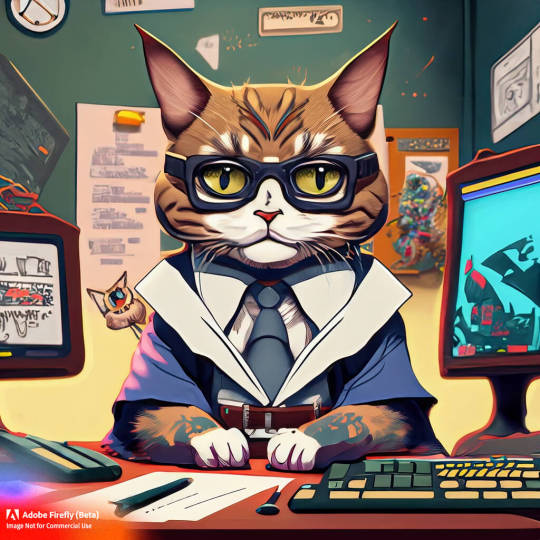
View On WordPress
#cognitive development#critical thinking#digital media#e-learning#education#engagement#game design#gaming culture#immersive experiences#interactive learning#James Paul Gee#learning#motivation#pedagogy#player agency#technology#video games
0 notes
Text
Days of the week…
0 notes
Photo


Artiști și Pedagogi UVT Facultatea de Arte și Design Timisora
https://libertatea.rs/spatiu-cosmic-teren-fertil-al-imaginarului-fascinat-infinit-si-misterios/
#Artiști și Pedagogi#Facultatea de arte si design#Timișoara#gabriel kelemen#Cosmic Octave#Timișoara Capitală Culturală Europeană#legea octavei
0 notes
Text

Rada Krivokapic Radonjic is a famous fashion designer and stylist whose signature style of classic, elegant yet luxurious ready-to-wear helped introduce ease and streamlined modernity to 21th-century dressing.
Early life
Rada Krivokapic Radonjic is originally from Kotor, Montenegro. Her parents are father Djuro Krivokapic and mother Vidosava Kaludjerovic. She also has an older brother named Radoslav Rajo Krivokapic. Her brother is a sailor, her mother a health care worker/nurse at Kotor General Hospital, and her father a factory worker.
Education
Talking about her educational background, she passed her Master's level in 2018. The program was funded by the German Government and was also designed according to the German education system. She had enrolled in Law, Professional, and Occupational Pedagogy, Trade, and Economy. She joined the School of Fashion and Specialization for Fashion Designer and Stylist. She graduated from this school of fashion from Belgrade in 1996, which was under the Paris system in collaboration with the Academy of Fine Arts. For her fashion school, she did an internship under Giorgio Armani Milan in 1997. Working for one of the world's most famous fashion creators, she got the opportunity to meet the best fashion creators to advance her knowledge base. Likewise, she completed her Ph.D. in Fashion Design in Belgrade in 1998.
Rada Krivokapic Radonjic, a visionary in the world of fashion, hails from the picturesque town of Kotor, Montenegro. Her creative journey has been nothing short of exceptional, combining classic designs with a deep commitment to sustainability. Born into a humble family, Rada’s passion for fashion stemmed from her early exposure to the industry through her work with esteemed designers like Giorgio Armani, Gianni Versace, Valentino Garavani, Karl Lagerfeld, and Roberto Cavalli.
Professional Life and Career
Talking about her professional life, she is famous as a designer and a stylist. She is the founder of Rada Krivokapic Radonjic, Kovilm and Rada Radonjic luxury clothing brands. They were established in the city of Kotor, Montenegro. In 2006, she designed the collection "Ostvarene Rijeci". The collection was inspired by her deceased father. Moreover, she collaborated with model Filip Kapisoda in 2010 and had a number of fashion shows in 2018. Furthermore, she also organized several fashion shows in the city of Yugoslavia. She also work as Costume Designer in Kotor. Moreover, Rada also designed a new fashion accessory called "Kovilm". She designed it for the 2019 fashion show called "Svijet Bez Sukoba". Kovilm is a garment worn around the neck, which symbolizes the transformation from tie and bow-tie. Additionally, Rada has also written the books 'Odijevanje' that translates to "Dressing" and 'Krojenje i sivenje' that translates to "Tailoring and sewing". Her books are related to the issues in the fashion and clothing world, which is influential for aspiring models, designers, and stylists. She is mostly based in her hometown Kotor. However, she also has her professional links in Podgorica, the capital of Montenegro. She designed common folk costume called Zentivns 2022.
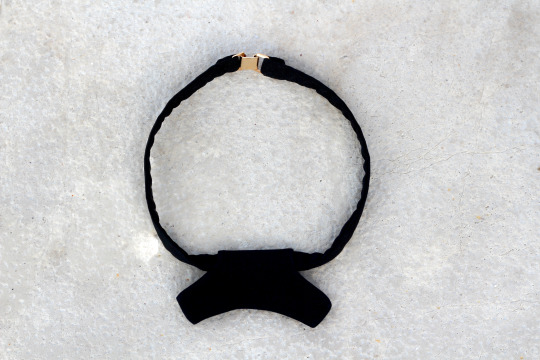
Awards, Net Worth
Rada Krivokapic Radonjic has won several awards for her humanitarian contributions and assistance. She has also received Humanitarian Contribution Awards. In 2023, Rada Krivokapic Radonjic is The World's Best Fashion Designer of The Year 2023 London, United Kingdom by Corporate LiveWire.
Personal Life
Reflecting on her personal life, Rada Krivokapic Radonjic gave birth to four children Nedjeljka Nadja Radonjic (1999), Valentina Radonjic (2001), Nebojsa Radonjic (2007) and Teodora Radonjic (2013). Furthermore, she maintains a good professional and personal life, free of scandals and controversies.



#rada#radakrivokapicradonjic#kovilm#kotor#fashion#style#fashion designer#stylist#couture#runway#dress#classic#casual#musthave#womenfashion#man fashion#men fashion#woman beauty#photography#photoshoot
3K notes
·
View notes
Note
niceys positive anon!! i don't agree with you on everything but you are so clearly like well read and well rounded that you've helped me think through a lot of my own inconsistencies and hypocrises in my own political and social thought, even if i do have slightly different conclusions at times then u (mainly because i believe there's more of a place for idealism and 'mind politics' than u do). anyway this is a preamble to ask if you have recommended reading in the past and if not if you had any recommended reading? there's some obvious like Read Marx but beyond that im always a little lost wading through theory and given you seem well read and i always admire your takes, i wondered about your recs
it's been a while since i've done a big reading list post so--bearing in mind that my specific areas of 'expertise' (i say that in huge quotation marks obvsies i'm just a girlblogger) are imperialism and media studies, here are some books and essays/pamphlets i recommend. the bolded ones are ones that i consider foundational to my politics
BASICS OF MARXISM
friedrich engels, principles of commmunism
friedrich engels, socialism: utopian & scientific
karl marx, the german ideology
karl marx, wage labour & capital
mao zedong, on contradiction
nikolai bukharin, anarchy and scientific communism
rosa luxemburg, reform or revolution?
v.i lenin, left-wing communism: an infantile disorder
v.i. lenin, the state & revolution
v.i. lenin, what is to be done?
IMPERIALISM
aijaz ahmed, iraq, afghanistan, and the imperialism of our time
albert memmi, the colonizer and the colonized
che guevara, on socialism and internationalism (ed. aijaz ahmad)
eduardo galeano, the open veins of latin america
edward said, orientalism
fernando cardoso, dependency and development in latin america
frantz fanon, black skin, white masks
frantz fanon, the wretched of the earth
greg grandin, empire's workshop
kwame nkrumah, neocolonialism, the last stage of imperialism
michael parenti, against empire
naomi klein, the shock doctrine
ruy mauro marini, the dialectics of dependency
v.i. lenin, imperialism: the highest stage of capitalism
vijay prashad, red star over the third world
vincent bevins, the jakarta method
walter rodney, how europe underdeveloped africa
william blum, killing hope
zak cope, divided world divided class
zak cope, the wealth of (some) nations
MEDIA & CULTURAL STUDIES
antonio gramsci, the prison notebooks
ed. mick gidley, representing others: white views of indigenous peoples
ed. stuart hall, representation: cultural representations and signifying pratices
gilles deleuze & felix guattari, capitalism & schizophrenia
jacques derrida, margins of philosophy
jacques derrida, speech and phenomena
michael parenti, inventing reality
michel foucault, disicipline and punish
michel foucault, the archeology of knowledge
natasha schull, addiction by design
nick snricek, platform capitalism
noam chomsky and edward herman, manufacturing consent
regis tove stella, imagining the other
richard sennett and jonathan cobb, the hidden injuries of class
safiya umoja noble, algoriths of oppression
stuart hall, cultural studies 1983: a theoretical history
theodor adorno and max horkheimer, the culture industry
walter benjamin, the work of art in the age of mechanical reproduction
OTHER
angela davis, women, race, and class
anna louise strong, cash and violence in laos and vietnam
anna louise strong, the soviets expected it
anna louise strong, when serfs stood up in tibet
carrie hamilton, sexual revolutions in cuba
chris chitty, sexual hegemony
christian fuchs, theorizing and analysing digital labor
eds. jules joanne gleeson and elle o'rourke, transgender marxism
elaine scarry, the body in pain
jules joanne gleeson, this infamous proposal
michael parenti, blackshirts & reds
paulo freire, pedagogy of the oppressed
peter drucker, warped: gay normality and queer anticapitalism
rosemary hennessy, profit and pleasure
sophie lewis, abolish the family
suzy kim, everyday life in the north korean revolution
walter rodney, the russian revolution: a view from the third world
#ask#avowed inframaterialist reading group#i obviously do not 100% agree with all the points made by and conclusions reached by these works#but i think they are valuable and useful to read
1K notes
·
View notes
Text
ratio excels in all that can be taught, and teaches all he excels at. while you certainly recognise his scientific talents (but then, what contrarian fool would deny them?), you hold no respect for what he dares call pedagogy.
he is rude, tactless, emotionally unaware to the point of outright cruelty towards the most unfortunate of his students. he expels few, as they tend to drop out before he loses hope for their improvement, though that is little comfort to crushed egos. the 0,01% who pass are rightfully lauded as geniuses on par with their stringent professor.
three auditoriums over, you teach engineering—nothing lifesaving the way ratio's innovations are. still, your name appears in the occasional publication, and your students are proud to learn from you. you did assist in designing and building many of the genius society's and intelligentsia guild's spacecrafts. you're proudest of your wards' achievements; each work, each project, each test, an occasion to climb to newer, brighter heights.
your colleagues decry your methods. coddling and pampering, shaping a generation of prissy engineers, ill-equipped for the universe. you've gotten into scuffles with jerks who claimed you were bloating your students' results and their doctorates ought all to be revoked.
"maybe my courses have a 99% passing rate because i'm an actually good professor." you've said that a solid dozen times, and gotten punched at least half of those times.
somehow, ratio has never been among your detractors. the reverse is true. you criticise the way he forgoes teaching for bashing students' merest mistakes, as if they would find illumination in insults, and though you have attempted to bring it up to him, his attitude has hardly improved, and his classroom retention even less so.
"knowledge shouldn't be bitter medicine," you rant, voice nasal from the nosebleed you're pinching away, as he inspects the nicks and bruises on your face. he nods absently, and you waggle a hand before his eyes. "you above all! listen! listen well and good, knowledge should be fun, an adventure, a reward—it should be sweet. why do you insist on making it such a miserable chore?"
"should you be antagonising the man currently tending to you?"
groaning, you whack his hands off. "forget it. i'm fine. and i'll just ring up a doctor if it gets worse."
"i'm a doctor."
"a different doctor, obviously."
you slip down to your feet and take a few steps, wading past him with some effort, as though trying to walk in a wild river, pushed about by currents rushing your way. he grips your arm when you stumble, but you shake him off.
"signs of a concussion," he says. "call the hospital."
you flip him the bird, but fetch your phone all the same.
ratio is left alone, fingers tinged with your blood, unused band-aids and disinfectant on the desk. for all his genius, he hasn't mastered the emotional and interpersonal skills you value so highly. he used to loathe niceness for niceness's sake—a sycophant's game. but you support your students so all may succeed and do not suffer one mean remark about them. he admires that: your kindness, your grit.
#ratio x reader#dr ratio x reader#veritas ratio x reader#ratio hsr x reader#hsr x reader#honkai star rail x reader
354 notes
·
View notes